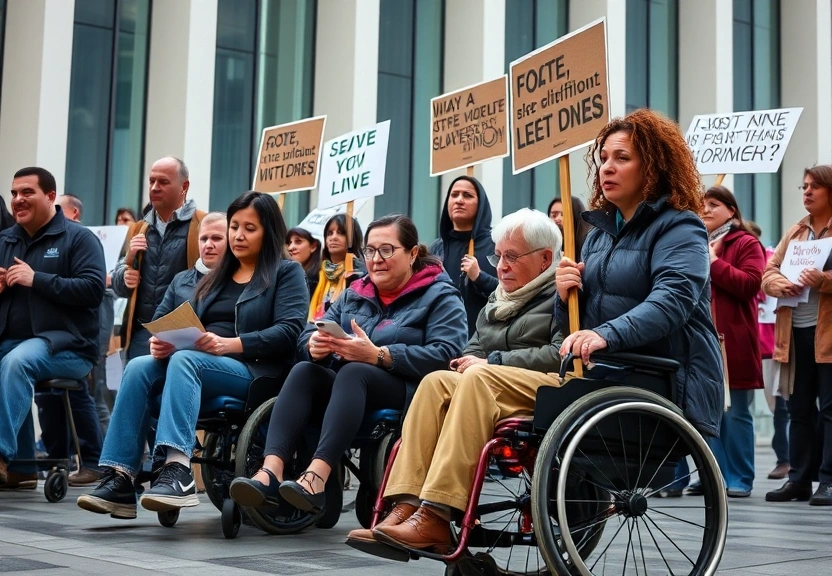Disabled Activists Slam Government’s Weak Welfare Bill: A Fight for Dignity Continues
The recent developments surrounding the UK government’s welfare bill have ignited a firestorm of criticism from disabled activists. As the government introduced a series of concessions regarding personal independence payments (PIP), campaigners have labeled these changes as inadequate and indicative of a deeper systemic failure. This article explores the implications of the welfare bill, the responses from the disabled community, and the ongoing fight for dignity and respect in disability.

Tim Boxall, a 50-year-old activist living with multiple sclerosis, exemplifies the plight of many disabled individuals affected by the welfare bill’s revisions. Despite the oppressive 32°C heat, he traveled to Westminster to express his dissent, underscoring the importance of advocacy in the face of adversity. For Boxall, PIP represents more than just financial support; it has been a vital lifeline that facilitates a semblance of normalcy and dignity in his daily life. This article examines the broader significance of such narratives and the urgent need for reform in government policies related to disability welfare.
The Context of the Welfare Bill
The welfare bill, which aims to overhaul existing support structures for disabled individuals, has been a contentious topic within UK politics. The government’s proposed changes were initially met with optimism by some, suggesting a shift towards more supportive policies. However, as details emerged, particularly regarding PIP, the narrative quickly shifted to one of disappointment and frustration.
The Role of Personal Independence Payments
Personal Independence Payments were introduced to help disabled individuals cover the additional costs associated with their disabilities. For many, including Boxall, PIP is a crucial component of their financial support system. The government’s climbdown on PIP reforms has raised concerns among activists about the adequacy and sustainability of support for those who rely on it.
Government Concessions: A Desperate Measure?
The recent concessions made by the government regarding PIP have been described as “patchwork” and “desperate” by critics. Activists argue that these last-minute changes do not address the fundamental flaws in the welfare bill. Instead, they represent an attempt to placate dissenters without genuinely improving the situation for disabled individuals.
Voices from the Disabled Community
The response from the disabled community has been overwhelmingly critical of the government’s approach. Many activists, like Boxall, have expressed feelings of anger and disappointment. The consensus is that the government has failed to recognize the dignity of disabled individuals and has instead prioritized political expediency over genuine support.
Activism in Action
Protests and advocacy efforts have become increasingly visible as disabled activists rally against the government’s welfare reforms. These actions serve not only to voice dissent but also to raise awareness about the issues faced by disabled individuals across the UK. Activists emphasize that their fight is not just about financial support; it is about the respect and dignity that every individual deserves.
The Importance of Allies
Disabled activists are calling for allies within the broader community to support their cause. Collaboration with non-disabled individuals and organizations can amplify their message and strengthen their advocacy efforts. By working together, they hope to create a more inclusive society that recognizes the rights and needs of disabled individuals.
Key Implications of the Welfare Bill Changes
The changes to the welfare bill and PIP have far-reaching implications for disabled individuals and society as a whole. Below are some critical points that summarize the impact of these reforms:
- Financial Security: The revisions may jeopardize the financial security of many disabled individuals who depend on PIP for essential needs.
- Access to Care: Reduced funding may limit access to necessary care services, impacting the quality of life for disabled individuals.
- Social Inclusion: The lack of adequate support can further isolate disabled individuals from society, hindering their ability to participate fully in community life.
- Advocacy and Awareness: The pushback against the welfare bill highlights the importance of advocacy and raising awareness about the challenges faced by disabled people.
- Calls for Reform: Activists are using this opportunity to call for comprehensive reform that addresses not only financial support but also broader societal attitudes towards disability.
Frequently Asked Questions (FAQ)
1. What are Personal Independence Payments (PIP)?
Personal Independence Payments are financial support provided by the UK government to help disabled individuals cover the extra costs associated with their disabilities.
2. Why are disabled activists against the recent welfare bill changes?
Disabled activists argue that the recent changes to the welfare bill, particularly regarding PIP, are inadequate and fail to address the systemic issues faced by disabled individuals.
3. How can non-disabled individuals support disabled activists?
Non-disabled individuals can support disabled activists by raising awareness, participating in advocacy efforts, and challenging societal attitudes towards disability.
4. What impact do welfare reforms have on disabled individuals’ quality of life?
Welfare reforms can significantly impact the quality of life for disabled individuals by affecting their financial security, access to care, and overall social inclusion.
5. What are the next steps for disabled activists following the welfare bill changes?
Disabled activists plan to continue their advocacy efforts, pushing for comprehensive reforms that prioritize dignity, respect, and adequate support for all disabled individuals.
Conclusion
The ongoing fight against the government’s welfare bill reflects a broader struggle for dignity and respect within the disabled community. As activists like Tim Boxall continue to advocate for meaningful change, it is crucial for society to listen and respond with empathy and action. The welfare bill may have undergone revisions, but the need for comprehensive support and respect for disabled individuals remains urgent. The fight for dignity in disability is far from over, and with continued activism and solidarity, there is hope for a more inclusive future.
📰 Original Source
Este artigo foi baseado em informações de: https://www.theguardian.com/politics/2025/jul/02/disabled-people-react-watered-down-welfare-reform-bill-passes


